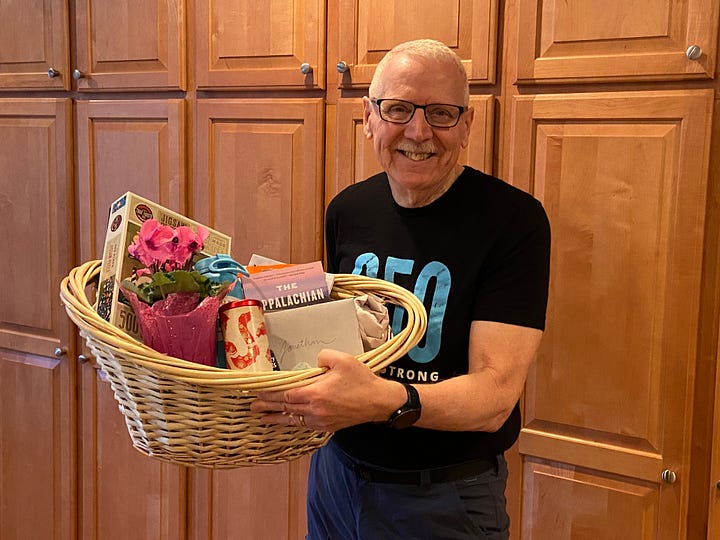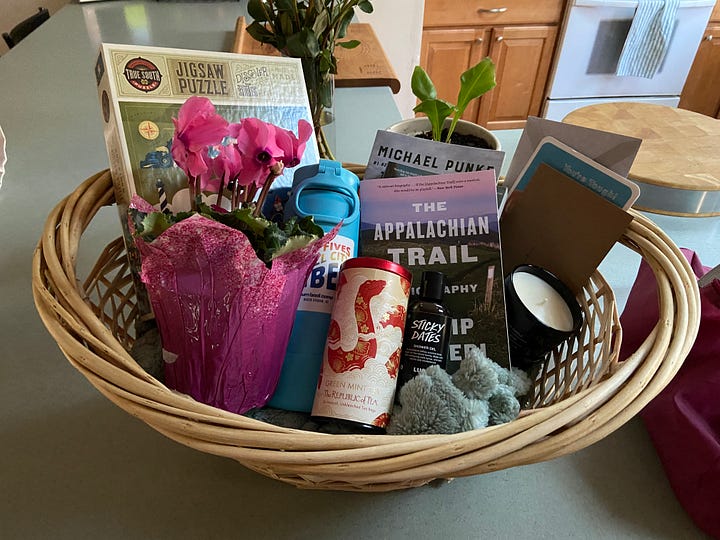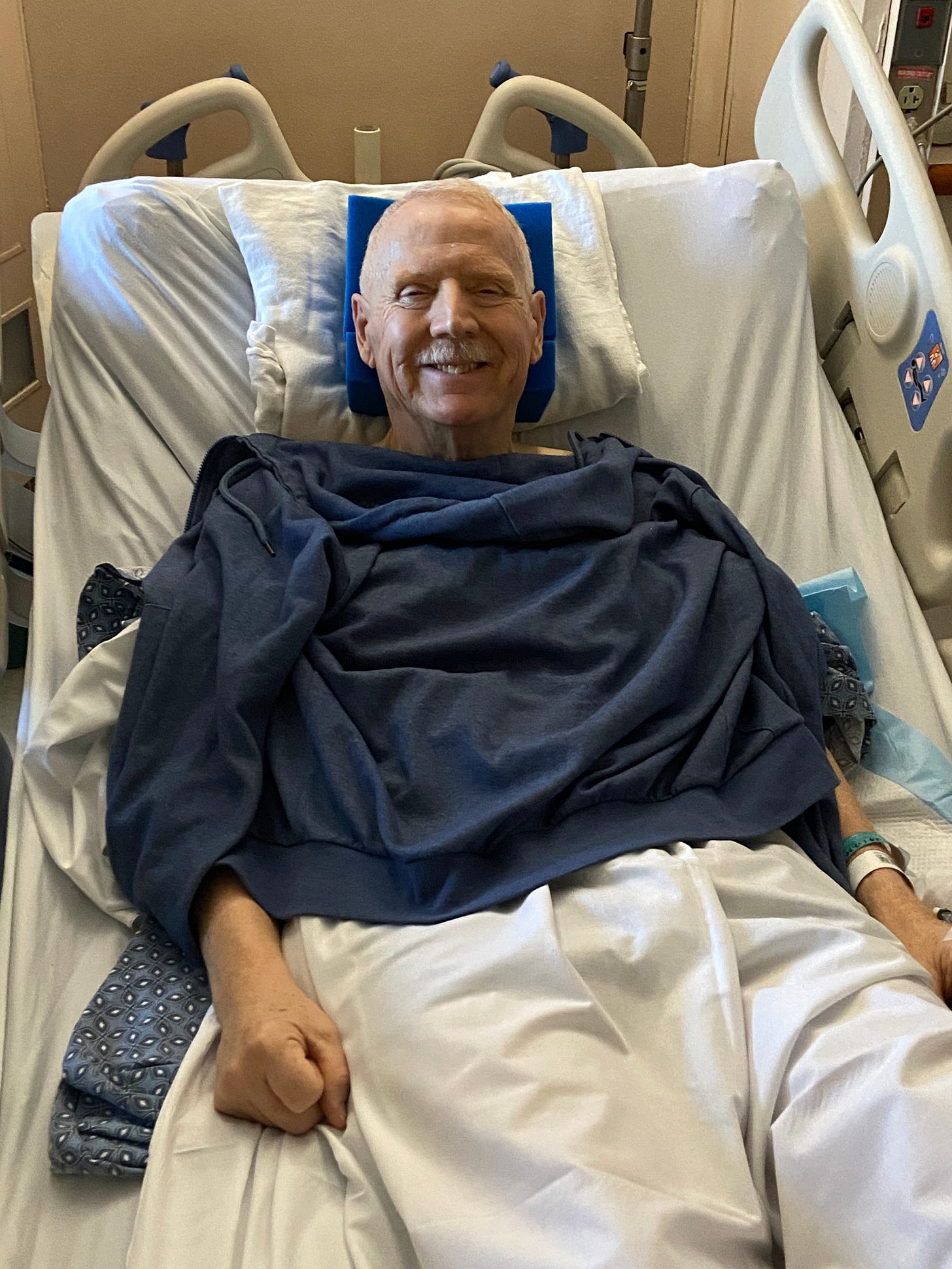Surgery!
MST. Chapter 41
This is my serialized story of hiking the Mountains-to-Sea Trail (MST), a 1,175-mile route that crosses the state of North Carolina. I’m hiking west from Jockey’s Ridge near Nags Head on the Outer Banks of the Atlantic Ocean to Kuwohi (formerly Clingmans Dome) near the Tennessee border in the Great Smoky Mountains. If you’d like to start at the beginning of my story, click here.
See the Mountains-to-Sea map at the bottom for reference.
The surgeon, I swear, looks like Marcus Welby from the old television show Marcus Welby, MD. As we discuss my surgery, he tells me he actually hiked the Camino. Clearly, he is trying to relate, especially when I mentioned I hiked Camino’s five hundred miles with my sister-in-law back in 2022 as well as the nine hundred miles of the Mountains-to-Sea trail by myself this past year. To be supportive, I say, “Really, you hiked the Camino? That’s incredible!” He does not look like hiking is anything he would naturally do. Golf maybe, but not hiking.
“Yes,” he says, “I went with some friends and we only had a week’s vacation.”
“A week? You must have started 100 km from Santiago so you could earn your Compostela.” The Compostela being the certificate that indicates you’ve successfully completed the Camino de Santiago. One hundred km is the minimum you need to walk. A week is easily doable. Some people do it in a weekend.
“Actually I don’t remember,” he says, looking at my chart, “BUT I know we didn’t walk that far and we only stayed in nice hotels.” He laughs, looking up at me. “In truth, I was more focused on the culinary experience.”
“I should have done it your way,” I say with a smile, though I am not sure how one could walk the Camino by only staying in nice hotels.
“Well, if I were you, don’t walk the Mountains-to-Sea Trail,” I respond, “as nice hotels don’t exist, motels are far and few between, and, I swear, conveniences store expanded my prostate exponentially.”
Our conversation pauses after that. He’s either thinking about convenience stores in North Carolina or is about to get serious regarding my surgery. It turns out it’s the surgery: we go through my various test results—good news and bad from the biopsy and petscan taken over the past two months—I get all the information I need, but what I want to ask is more basic: how soon can I get back on the Mountains-to-Sea Trail?
Instead, I listen as he explains why surgery is my best option. Finally he says what I have been waiting to hear: “If you want to be on the trail, say, by this fall, get the surgery.”
Now two weeks later, I am being wheeled into the oncology operating rooms at the Duke University Hospital. It’s just after 7 AM and I have been up since 3 AM this morning. At 4 AM, for the second time in the past six hours, I shower with a special soap the doctors gave me. It feels no different than the soap I normally use.
I am not supposed to eat the night before my surgery. A couple of days earlier I decide that this would be a perfect time to add a fast to my routine. So, I stop eating forty-eight hours before my big day just to be sure my intestines are empty. What my intestines have to do with radical prostatectomy surgery beats me, but this will insure I don’t poop all over the operating table.
In pre-op, a nurse asks me when I last ate. I lie and say, “Yesterday afternoon.” My hope is that this little fib doesn’t kill me. But, if it does, at least I will have lost five pounds due to the fast and will be looking good at my funeral.
Since 5 AM I had been in the hospital’s large surgical waiting area and was surprised by the number of people in the surrounding chairs. I tried to calculate the number of patients who could get surgery in a day if all the operating tables were active, starting so early in the morning, but gave up as I didn’t know how many surgical rooms there are here in the hospital and I couldn’t tell how many of these people in the waiting area are actually patients. Many of the people sitting here could be family members or friends, just like my wife Karen sitting next to me.
Still, the nurses continuously call people back to pre-op and, so too, around six o’clock my name is called. I kiss Karen who says she will be waiting here during my surgery. As I get up I tell her I love her very much.
“Do me a favor,“ I tell her, “if I die, please complete the Mountains-to-Sea Trail for me.” She knows I still have two hundred and fifty miles to go.
“No way,” she says, “if you want it completed, you better come back alive.”
Now the anesthesiologist, pushing the gurney to the operating room, tells me that he plans to hike the Mountains-to-Sea trail with his two boys. Only, he says, he will need to do it in small doses as his kids are only eight and eleven.
“At their ages, you should take your boys camping” I say looking up from the gurney as we move down the hall, “Maybe get them in Boy Scouts,” I add, even though I don’t mention how much I hated Boy Scouts as a kid.
In the operating room the nurses and the anesthesiologist help me slide over onto an operating table. The anesthesiologist tells me he does go camping with his kids but now needs to focus on my surgery. I am thinking, rather, ‘why did I hate Scouts?’ as he lowers a plastic mask over my nose and mouth. In seconds I am unconscious…
… and wake up a couple of hours later in the recovery room. Karen is sitting nearby when a nurse leans over and says “welcome back.”
Karen gets up and stands next to the bed. She kisses me. “Welcome back,” she repeats. After a few minutes of small talk, she says she’ll get our daughter, Helen, who arrived later in the morning to join Karen in the waiting room. I am happy to see Helen and show both Helen and Karen my five-inch surgical incision that extends from below my belly button to just above my crotch. It’s an ugly scar that the nurse assures us will look much better a couple of weeks.
What really captures my attention, though, is the tube running out from under the covers near my waist. It extends to a plastic bag on the floor near the bed. In looking under the sheet I see it runs through the tip of my penis and is allowing urine to flow directly from my bladder into the bag. Only my urine looks dark-red, like beet soup. The nurse, seeing me staring at the bag, says, “Don’t worry, this is normal after surgery. The blood will go away over the next several days.”
I know from the literature I was given before the surgery I will be connected to this catheter for the next two weeks. “Maybe longer,” the nurse says, “If you can’t get the blood to stop. The doctor wants no blood in the bag when I return in two weeks.”
The next day I go home somewhat freaked out by how much blood continues to accumulate in the bag. Clearly my first order of business is to reduce the blood flow so that at the next checkup I can get this catheter removed.
This seems like it would be easy—and perhaps for others it is—but by the start of the second week I am very concerned about the amount of blood I am still passing into the bag. This week I decide to get serious and spend as much time as I can lying flat on my back, which the prostate literature says will reduce the blood discharge.
Maybe, the stitches used to sew my urethra together after cutting out a portion with my prostate, has unravelled. A loose urethra spraying blood and urine all over my inners would not be good.
By Tuesday’s appointment, the blood hasn’t stopped draining into the bag, but it is now light pink. The nurse, when I show her, assures me, “Your stitches aren’t spraying ‘your inners!’ Let’s get that catheter out.” These are the sweetest words I’ve heard all week. After two weeks, seven days of which I spent lying in bed constantly checking the bag for signs of improvement, I am desperate to get the catheter removed.
The nurse tells me to take a deep breath and blow out as long as I can, and when I do, she pulls the long tube out from my penis. It’s an unbelievable sensation culminating in a sudden sense of freedom. My penis is very happy.
Incontinence, I expect, then, when I leave the oncology clinic will be my next big hurdle, but, instead, it’s the area where my stitches descend below my belly button like a zipper that throbs. The entire area is sore to the touch and does not like anything pressing against it—like a belt or my pants or even my Depends underpants. The next two weeks I keep that area as free of clothing as possible and let my sutured core heal. This proves to be unique to the type of surgery I had. I can’t help but wonder if radiation would not have been a hell of a lot easier.
Incontinence, finally, the situation I’ll experience for the next several months—if not the rest of my life—is not as significant as I expect. The blood that was discharging from the Foley Catheter stopped almost immediately once the catheter was removed. On top of that, the flow of urine is not nearly as continuous as when the catheter was connected directly to my bladder. My pelvic floor muscles, though weaker than I would have liked, are strong enough to hold back the flow. In time, with walking and Kegel training exercises focused on these muscles, I hope to be free of this issue too.
Certainly I don’t want to change my Depends underpants two or three times a day while I am hiking. A backpack full of Depends would, indeed, be problematic, though weight-wise, might be lighter than a tent. Still, I can’t imagine “cowboy” sleeping around a campfire in my gray Depends underpants.
My goal now is to walk every day to get back into shape. I hope to increase my daily distance with each passing week. I have two-to-four weeks to go before I am free the surgeon’s restrictions and truly expect to have healed sufficiently to be able to go back to my workout gym—taking it easy, for sure, but, so too, getting back into the routine I had before my surgery.
Speaking of which, the last day before my surgery my friends at the gym surprised me with a basket of goodies to help in my recovery—knowing it would be at least six weeks to two months before I could return. The basket contained everything I would ever need. Most importantly, it held a ton of love from a group of close friends.


The Mountains-to-Sea Trail awaits. Betsy Brown, the Associate Director, in recent correspondence, says tongue-in-cheek, “I am trying to keep my end of the bargain and get the trail ready for you. There are a few stumbling blocks,” she writes, “but I’m about ready to…send in the volunteers to rehab the trail... Just for you!”
Now that’s motivation to wean off the Depends, to return to the gym, and to be ready to tackle the final segments of the trail this fall.
Mountains-to-Sea Trail. I am currently on hold due to the impact of Hurricane Helene. I am heading from East to West and am at the beginning of Segment Four.




Hey Jonathan, great to finally hear the details of your "medical adventure." As a kindred prostate cancer patient, I'm so happy you're on the mend and looking forward to nothing less than a healthy, active future. Like any happy love story ending, there IS, "life after prostate." ;)
Jonathan, I am glad to hear that your surgery went well. Once again, I am impressed by your focus to complete the trail and not let anything stand in your way. I was on a portion of the MST yesterday hiking at Grandfather Mountain and thought about you as soon as I saw the first white blaze. I look forward to reading about your return to the trail. Wishing you a speedy and smooth recovery.